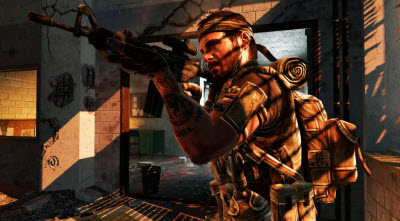
Thomas Tippl is chief operating officer and acting chief financial officer at Activision Blizzard. As such, he helps run the largest independent publisher of video games. The company published Call of Duty Modern Warfare 2, the best-selling video game of all time last November. But it also so a huge blow-up at the Infinity Ward game studio that created the game, resulting in the firing of Infinity Ward’s founders and litigation. The company also has some huge titles coming this year, including Call of Duty Black Ops (developed by Infinity Ward’s sister company), Starcraft II, and World of Warcraft Cataclysm. We sat down with Tippl at the E3 trade show last week (where Activision only had meeting rooms) and conversed about a wide range of game industry topics. Here’s a transcript of the interview.
VB: How has E3 been for you?
TT: It’s a great show. Every year, it’s good to see the first parties bringing to market new innovations. They are investing in their marketing, getting people in the store, getting buzz going. It is extremely helpful in this market environment. Nintendo again showed their brilliance with the 3DS. They are making that 3D experience without the need for glasses. That is excellent. We have a game in development for the 3DS launch. We are very excited about it.
VB: Can you describe it?
TT: It’s going to be a DJ Hero game. On Sony Move and Microsoft Kinect — a lot will depend on where they are priced and where the installed base will be. But we can see this opening up new innovation opportunities for certain games. Not for all games. But it opens up new opportunities for Tony Hawk skateboarding and our other franchises. Our games compare very favorably to what I see out there on the floor. Whether that is Starcraft II coming from Blizzard Entertainment (on July 27) or Call of Duty Black Ops, World of Warcraft Cataclysm, our new Tony Hawk series, and DJ Hero 2. We are pretty excited about our prospects for 2010.
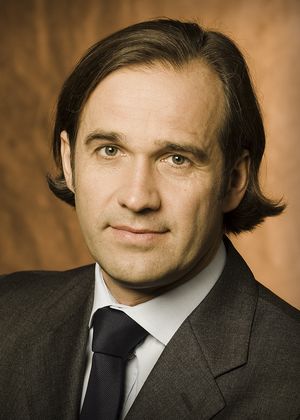 VB: I was very impressed with Black Ops. I noticed with Call of Duty World at War that (game developer) Treyarch stepped up. This Black Ops game is an even bigger step up for them.
VB: I was very impressed with Black Ops. I noticed with Call of Duty World at War that (game developer) Treyarch stepped up. This Black Ops game is an even bigger step up for them.
TT: It’s going to be a phenomenal game and it will blow everybody’s mind. Treyarch will shake the label that the press has put on them on the A team (a reference to Infinity Ward) versus B team. That is history. (Tippl is pictured right).
VB: When you were thinking about that some time ago, how far back were you thinking that you wanted them to be an A team at Treyarch?
TT: We want every one of our studios to be an A team. But it’s a very difficult thing to accomplish. If it were that easy, you would see a lot more of them.
VB: I guess it means difficult choices like narrowing down what they work on?
TT: Exactly. That is one of the things we realized. Studios that had multiple games in development were underperforming on most of their games. The key resources get spread too thin, and as a consequence you end up with two or three average games instead of one great game. In this market, only great games sell.
VB: Was it a few years ago that this sank in?
TT: Maybe two years ago. The tailwinds stopped blowing. The market got more challenging. The bar for quality got reset, and we had to respond to that.
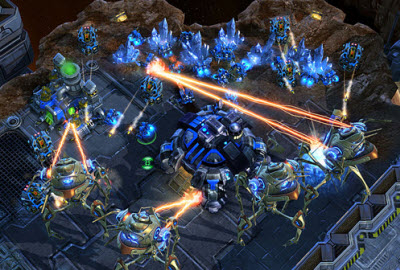 VB: And yet you probably don’t want to strive for 10-year development cycles? Starcraft II is in that range.
VB: And yet you probably don’t want to strive for 10-year development cycles? Starcraft II is in that range.
TT: Obviously, Starcraft II was not in development for 10 years. Blizzard has been very focused on growing World of Warcraft and they did an unbelievable job. Every year, people were skeptical. They broke 1 million subscribers. Then it was 2, 3, 4, 5, and now it’s 11 million. Every year they had to answer the same questions. They have done an incredible job improving that franchise, keeping the fan base happy, bringing new players in all of the time. Now they are ready with Starcraft II and Battle.net (the online game service for Starcraft II and other games). It’s going to be a great hit. They have done a phenomenal job with the single-player story. Multiplayer is always off the charts. BattleNet will take it to a new level.
VB: The Facebook integration was clever. It is more than what others have done.
TT: Yes. they are doing real, live identification. You can find your friends and communicate across games for the first time. These guys are really brilliant. They are so in touch with the gamer community. They have such a passionate base of developers.
VB: How is Activision Blizzard setting itself apart from the rest of the big companies in the game industry?
TT: We have set ourselves apart since the beginning of the console cycle by being very focused. That’s the way to bring great products to market. You go narrow and deep. That is the way you are rewarded by gamers. With that comes strong financial performance.
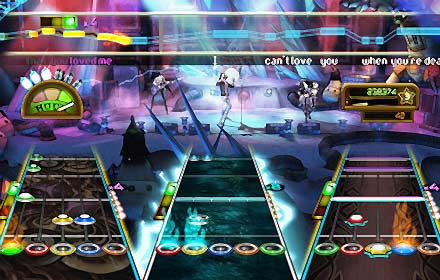 VB: If you looked at the music category and saw its sales go down, would that explain the whole industry’s underperformance in the last year or so. Is that what is wrong with the industry?
VB: If you looked at the music category and saw its sales go down, would that explain the whole industry’s underperformance in the last year or so. Is that what is wrong with the industry?
TT: Clearly the macroeconomic situation has put pressure on the consumer. The unemployment rate in double digits doesn’t help consumer confidence. As a result, the more casual players — for whom video games is not the most important thing to do in their lives — have become more selective in their purchases. The Wii platform has lost a lot of momentum. That is where you find those players in general. As long as the economy is in the shape that it is in, I don’t think it is prudent to plan for a turnaround in that trend. Having said that, we grew our Hero (music game) business on the Xbox in 2009. That’s where you find the more hardcore gamers. They continue to make purchases and there is a good reason for that. The value proposition of the number of hours of entertainment you can get from games like Call of Duty and Guitar Hero and World of Warcraft is phenomenal. That is why those businesses have held up so well. Call of Duty Modern Warfare 2 set sales records not just for a video game but for all of entertainment. They are the bright spots. There are challenges. We have to make sure we are fast enough to focus on the biggest opportunities.
 VB: I know you can’t talk about your litigation. But what is a way to pull above the Infinity Ward lawsuit and see what will happen going forward?
VB: I know you can’t talk about your litigation. But what is a way to pull above the Infinity Ward lawsuit and see what will happen going forward?
TT: The Infinity Ward situation was unique and unfortunate. We have been in this business 20 years. Seventeen game studios have joined us. We have never been in a situation like that. I don’t think we will be in a situation like that again because it was unique. We have great development talent. Two-thirds of the team is still there. We are complementing that with very aggressive recruiting and supplementing them with some of the very best resources we have in the company. We have made major investments in talent. We have launched the Sledgehammer studio with a very capable development team. We have added headcount. Treyarch is focused fully against Call of Duty. We have made big investment everywhere.
VB: Does this mean there will be a hiccup in the Call of Duty launch schedule?
TT: I don’t think so. This year we will have a first-person shooter with Call of Duty Black Ops. We will have a first-person shooter in 2011.
VB: The competition between the video game companies has entered into a pattern. If one team leaves a company, the other company snatches that team and knocks off what the first company was doing. They clone the other company’s best franchise. What is your observation about that? To me, it seems not so creative. It seems like ruthless business.
TT: We have to recognize we are in a business. Competition is always a good thing. The consumer benefits from that competition. The bar is constantly raised. Great new innovations are brought to the market through investments that development teams and publishers have to make. It is good for the industry and keeps it vibrant.
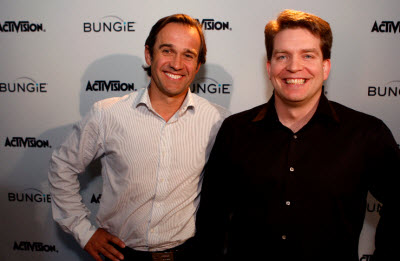 VB: In new intellectual property, where do you put your bets now?
VB: In new intellectual property, where do you put your bets now?
TT: We are always very selective about new IP. Just as in any other industry, the success rate of new IP is 1 in 100. You have to be cognizant of that. You have to gather the ingredients you need. We just entered the racing genre with Blur. You should not expect more than one or two of those per year from us. We believe that much bigger innovation opportunities are in the franchises that we have like Call of Duty, World of Warcraft, Starcraft, Diablo and others. We have a unnannounced massively multiplayer online game coming. We have Bungie (Tippl is pictured left with Harold Ryan of Bungie on right). We have massive franchise opportunities. We know that fan base very well and know what they would like to see in games. We can invest more in the product development and marketing because those franchises are so reliable. That’s how we reach the broadest audiences. The odds are always stacked against you with new IP.
VB: Is this pattern very similar to the way Disney or Nintendo treats IP? Every now and then they bring an old franchise out and dust it off.
TT: Yes. It’s possible for us to do that. We should start a rumor about Mech Warrior II. Do we still own that? Or how about Pitfall?
VB: What are some business predictions you would make in the next year?
TT: To me, it looks like 2010 is shaping up to be pretty similar to 2009. We don’t see a big macroeconomic rebound. The market will continue to bifurcate. Online continues to increase in importance. All of the things you saw in 2009, you will see again, including a phenomenal Call of Duty game.
 VB: What do you think of the digital online businesses such as Facebook games like FarmVille?
VB: What do you think of the digital online businesses such as Facebook games like FarmVille?
TT: It does impact the casual end of the market more than anything else.
VB: Do you think you need to be in it?
TT: We are in it in some way. We look at it as an opportunity for customer relationship management. We can market or manage to the players on Facebook. There are lower entry barriers here. We have brought the Guitar Hero game to the iPhone. If you look at the barriers to entry, it’s not obvious what we bring to the table that somebody else cannot just turn around and copy. Our success has been based on a lot of focus. There is plenty on our plate with all of the opportunities we talked about.
VB: It is interesting that people say Zynga is worth $4 billion or $5 billion.
TT: Yes. It is interesting. I previously started a venture fund at Procter & Gamble in 1999. When I look at what is going on right now in Silicon Valley in this space, it feels very much like 1999. It’s all about the eyeballs and every dollar that comes in the door is reinvested to get more eyeballs. At some point, that bubble is going to burst and there will be one or two that will be successful and the rest will all be gone.
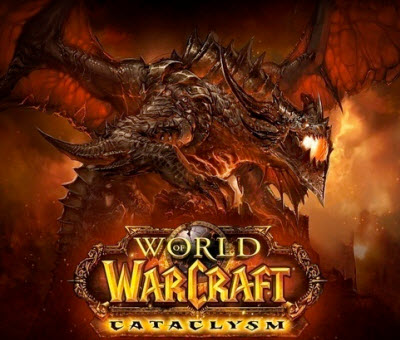 VB: The difference I see is that the leaders here are profitable. Back in 1999, nobody was profitable.
VB: The difference I see is that the leaders here are profitable. Back in 1999, nobody was profitable.
TT: That’s why I said one or two will survive. There were a few back then that did well out of the gate. A lot didn’t.
VB: Are you prepared to chase the gamers on every platform?
TT: Yes. Every platform that makes sense.
VB: When will you talk more about Bungie and what they are doing?
TT: Once Halo: Reach has shipped in the fall, you will see Bungie’s focus shift.
VB: On the free-to-play front, is there concern that will erode World of Warcraft base?
TT: No. There is no comparison to the quality of World of Warcraft.
VB: Maybe. But it is interesting to see Free Realms claim they have 10 million registered users (now 12 million).
TT: Are they paying $15 a month for it?
VB: No, the players at Free Realms are not. And they probably convert low numbers of them to paid players. But if there is more and more free stuff, what happens?
TT: It comes down to the quality of the free stuff. The quality of World of Warcraft is so high that not even other MMOs have shown any chance to be able to compete. There were some very well capitalized companies with well established intellectual properties that tried to compete. That includes Sony with Star Wars. They couldn’t make it happen. It’s the single most difficult thing to try to do.
VB: So life is good.
TT: Yes, I think so.
